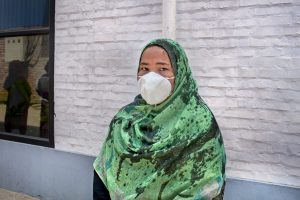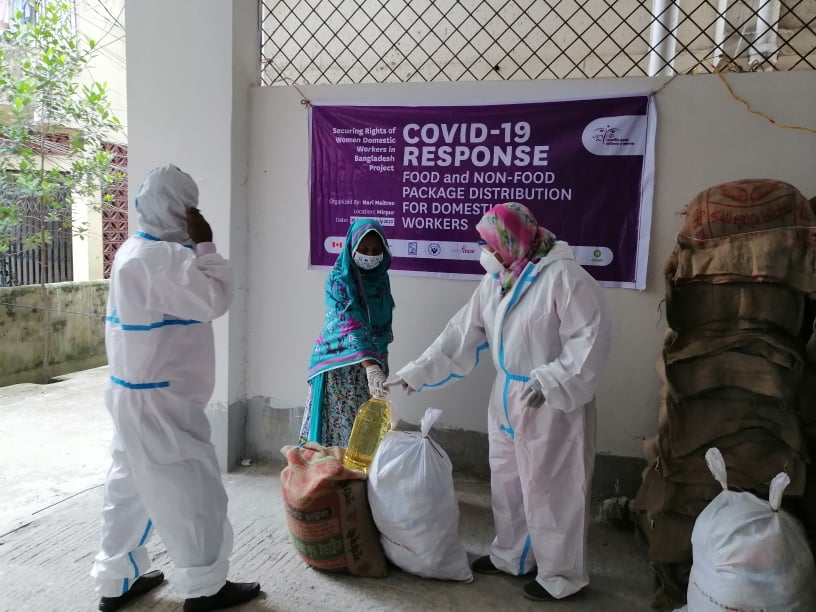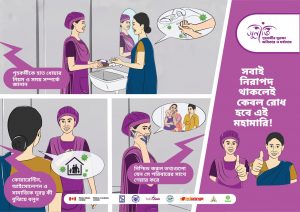Millions of women domestic workers face further slide into poverty
Millions of women domestic workers face further slide into poverty
“We are hungry and starving. This is now everyone’s situation. We cannot go back anywhere.”
Faced with fears of uncertainty, Mollika Begum waited outside a food distribution point in Dhaka run by Oxfam’s project Securing Rights and partner Nari Maitree.

Mollika Begum is a domestic worker in Dhaka, Bangladesh. Credit: Fabeha Monir / Oxfam
Like many women who work in the informal sector, the COVID-19 pandemic has left Mollika more vulnerable than ever before.
“My two sons have been asking for food since morning… My husband is a driver, but he is jobless now. Rent is due, and our children‘s education has stopped. The houses I used to work in as a housemaid are no longer employing help,” she explained.
As the world grapples with the economic fallout from COVID-19, women domestic workers are experiencing an even further slide into poverty due to the lack of food, safe water, hygiene supplies and health services.
In Bangladesh, acute poverty, dowry, divorce, climate change and family debts or loans drive women and girls to urban areas to seek work and a better life. In many cases, women like Mollika, who migrate to Dhaka, end up either as domestic workers or as part-time help. Most do not have mutually agreed-on working hours with their employers and overtime is not tracked or accounted for in their pay. Even though women domestic workers represent 17 per cent of the total labour force in Bangladesh, their labour rights are not safeguarded like many other sectors in the country. Rights to Bangladesh's minimum wage or decent working conditions still remain a battle that’s fought by most.
Since 2019, Oxfam’s Securing Rights program has worked to empower and organize women domestic workers with access to decent work and a life free from violence. The program aims to influence policymakers and stakeholders to protect the rights of domestic workers and recognize domestic work as a formal profession.
READ MORE: ‘There is no focus on the domestic workers’
When COVID-19 was first confirmed to have spread in Bangladesh in March 2020, a nationwide lockdown was imposed until May to curb the spread of the virus. It came as no surprise that many informal sectors were hit hardest by the pandemic. A large number of domestic workers were sent on unpaid leave by their employers who feared infection and many were told not to return until the situation became normal again. Almost a year later and ‘normal’ is still nowhere in sight.

A domestic worker comes to pick up their relief package from a distribution point. The food package contains rice, oil, lentil, flour, salt, potato, onion, sugar and sujifor one month for a family. The non-food package contains soap, washing powder, Dettol, gloves, sanitary napkins and cloth masks. Recipients also had their transportation charges coved to pick up the packages. Credit: Oxfam Bangladesh
An assessment of domestic workers in Bangladesh by Oxfam showed that 39 per cent of domestic workers received a one-time relief package while the majority were not covered by any relief initiative from the government or private sector. At the same time, 47 per cent said they are in dire need of food and almost 50 per cent said that there is no possibility of returning to their previous job.

One of many graphics put together as part of a social media campaign to raise awareness about employer duties during the pandemic. Credit: Oxfam Bangladesh
As a response to the pandemic, the Securing Rights program partners provided temporary support to domestic workers with food and other hygienic items. A social media campaign was also launched to raise employer awareness on COVID-19 hygiene prevention measures to keep both domestic workers and employers safe amidst the crisis.
While Securing Rights started long before COVID-19, continuing work to advocate for domestic worker’s rights has only grown in importance since the pandemic hit. If anything, the virus has exposed deep inequalities experienced by people across the world.
Oxfam has been working throughout the pandemic to support the most vulnerable and to ensure that governments include a recovery plan for at-risk communities — not only in Bangladesh but around the world.
READ MORE: ‘Coronavirus and the Case for Care

